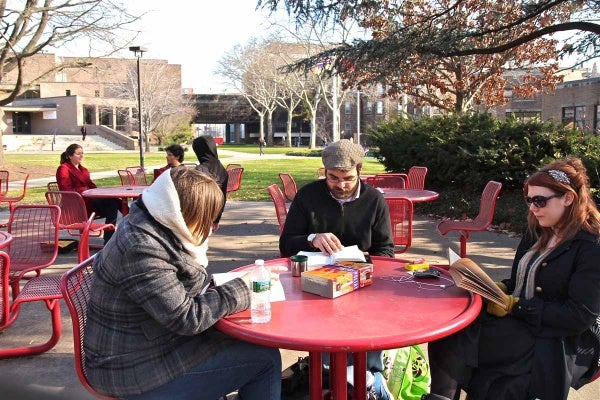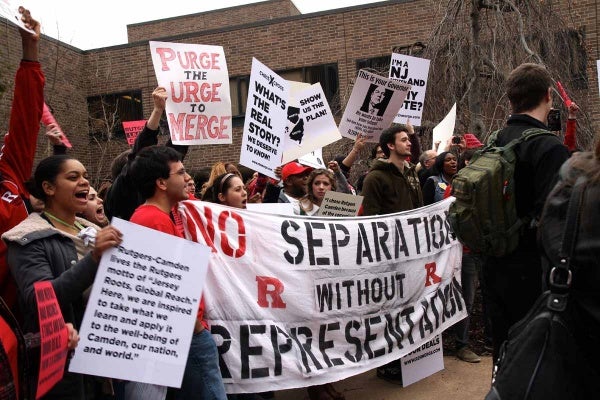Remaking Rutgers: Camden campus to become part of Rowan University
Gov. Chris Christie says the plan to break up the University of Medicine and Dentistry of New Jersey and merge Rutgers-Camden with Rowan University is “going to happen.”
The proposal may be a done deal for Christie, but it has sparked off a firestorm of criticism and controversy — particularly where the merger is concerned.
Some faculty members at Rutgers-Camden said they were blindsided by the wholesale merger, which they believed would only affect the medical school.
“There’s a sense of shock, surprise and betrayal that there was no consultation about this,” said Ellen Goodman, a professor at the Camden law school.
Others argue that merging the two schools under the Rowan name makes no sense. Rutgers is the larger and more prestigious school, and the decision to drop its name, they contend, is already having a negative impact.
In a January 31 letter to the chairs of Rutgers’ boards of governors and boards of trustees and President Richard L. McCormick, the law school faculty wrote that the merger talk is already hurting the school’s faculty recruitment efforts and could lead existing faculty to leave, as well as hurt the school’s ability to recruit new students.
But the announcement has not been met with dismay on all fronts.
Writing in an opinion piece in the January 31 Courier-Post newspaper, George Norcross — the formidable Democratic party boss of South Jersey — called the plan “exciting” and “inspired” and said it will boost the economy, improve the universities and “transform a city and region for generations to come,” including making Camden’s neighborhoods “safe, vibrant.”
It is against this backdrop that the Senate Higher Education Committee is holding a hearing today to discuss what actions must be taken to implement the most contentious recommendation of the UMDNJ Advisory Committee, the Rutgers-Rowan merger.
The outcome of the hearing is anything but clear; opinions of the stakeholders are sharply divided.
Officials at Rowan contend Christie can make the changes by executive order, with the legislature given 60 days to veto the reorganization. Rutgers officials say the ceding of its Camden college and law and business schools, will require action by the university’s board of governors and board of trustees.
And where does this leave the plan to restructure UMNDJ? Although that proposal has raised a number of issues, it has not raised the public outcry that the Rutgers-Rowan merger has, for several reasons.
For one, UMDNJ’s interim president and chairman support the revamping of the 42-year-old university, which enrolled almost 7,000 students in its eight schools in the past academic year.
The committee recommendation would reconstitute UMDNJ as New Jersey Health Sciences University, which would consist of the Newark-based medical, dental, nursing, health-related professions, and graduate biomedical sciences schools. UMDNJ’s University Behavioral Health Care, Public Health Research Institute and School of Osteopathic Medicine, would also be part of NJHSU but with much greater autonomy.
UMDNJ would give Rutgers-New Brunswick the Robert Wood Johnson Medical School, also in New Brunswick and the School of Public Health. Those two schools had a combined enrollment of 1,045 students in 2010-11.
Rutgers-New Brunswick would also get the Cancer Institute of New Jersey, located in Piscataway.
Some key north Jersey legislators initially approved the plan because it maintains University Hospital as both a teaching facility and as a provider of healthcare to Newark and Essex County. The plan suggests a private operator would run the state-owned hospital.
As Assembly Speaker Sheila Oliver (D-Essex) said, “Our demands on maintaining a strong hospital, healthcare, and university presence in Newark were taken into consideration.”
Both of those major recommendations were first unveiled as part of the committee’s preliminary report, made public last September.
That leaves the recommendation to have Rowan University absorb Rutgers-Camden.
Faculty members at Rutgers-Camden said they were blindsided by the proposal, first unveiled on January 25 when Christie presented and endorsed the UMDNJ committee’s report. The group’s charge was to recommend the best future for the state’s medical university and they did not suspect it would impact Rutgers-Camden in a negative way.
If anything, the Rutgers community thought any recommendation would strengthen the state university’s southern campus based on two earlier higher education reform reports.
The first report, by the New Jersey Commission on Health Science, Education and Training that was chaired by former Merck chief executive Roy Vagelos, called for creating a University of New Jersey with concentrations in the north, central and south. Issued a decade ago, the report envisioned UNJ-South in Camden/Stratford as combining UMDNJ’s Stratford campus and Rutgers-Camden.
That second report had UMDNJ affiliated with Cooper Hospital, before Gov. Jon Corzine in 2009 signed an executive order charging Rowan and Cooper Health System with creating a medical school in Camden.
The later report, issued in December 2010 by the Governor’s Task Force on Higher Education, stated, “Rutgers-Camden must receive appropriate support to contribute to Rutgers’ statewide mission.” Chaired by former Gov. Thomas H. Kean, the task force also stated that the campus should collaborate with other colleges and universities and “expand its research and instructional missions.”
Neatly tucked away on page 134, however, the Kean report discussed the “University of South Jersey” as a merger of Rutgers-Camden, Rowan, and possibly UMDNJ’s School of Osteopathic Medicine. And it is only in the last sentence of that section that the report names the primary school: “Should this happen, Rowan would become only the second full-purpose university in the country, after Michigan State, to have both an allopathic and an osteopathic medical school.”
Still, last September’s interim report by the UMDNJ held off recommending “the ultimate governance model” that would be best for South Jersey.
Its final report, made public two weeks ago, recommends Rowan be the university because, “Only Rowan’s programs are currently connected to Cooper Medical School.” Combining the schools is necessary, the report continued, “for Rowan to become a comprehensive public research university.”
That designation is essential, among other reasons, to give Rowan/Cooper a better chance at getting federal research dollars. New Jersey currently ranks 23rd of the 50 states in the amount of federal health and science grants it gets.
While the news surprised Rutgers faculty and students, it did not surprise everyone at Rowan.
According to a document on the Rowan Student Government Association’s website, the SGA met with acting university president Ali Houshmand on November 21, 2011, less than two months after Christie’s committee sought more time to ponder the question and more than two months before the recommendation would be made public.
The notes about the 30-minute meeting states that Rowan faculty are “already preparing” for the merger. The document also indicates that some students at Rowan have the same concerns that students and faculty at Rutgers-Camden have. Among these: How will the unprecedented merger of these schools be accomplished and what are the associated costs?
The UMDNJ committee noted “the considerable complexity” of the merger, particularly given that Rowan is at the same time opening a new medical school — construction of the building is underway and the first classes are slated to begin in September. The committee wrote that the plan is doable with public support and needed resources.
Nevertheless, the report neither outlines the steps needed to carry out the merger nor does it estimate the possible costs.
“It doesn’t seem plausible to me that you could create a higher research institute without a public investment of money, unless there is some other source of money,” Goodman said.
She added that the cost to keep the accreditation of the Camden law school alone will be significant. Anne Nicholas, a spokeswoman for the American Bar Association, said the merger would require the ABA to “accredit the school under the new conditions.”
Joe Cardona, a Rowan spokesman, said the reaccreditation would not be difficult, provided the law school still has the same programs and faculty in place.
He agreed, though, that the merger process would be complex and potentially costly.
“The report clearly says there needs to be adequate funding,” Cardona said. “How much it will cost remains to be seen.”
Critics said the UMDNJ committee did not take the proper time or do the extensive research necessary to back up its radical suggestion. At 50 pages, its report is the shortest of the three state higher education reports in the past decade, and almost half of those pages are taken up by the interim report issued last September. The identity of the new school is definitely a hot button.
In its January 31 letter, the Rutgers- Camden law faculty states, “We want to further enhance higher education in South Jersey and we recognize that this can be accomplished in myriad ways, including through a consortium. We resolutely believe, however, that any plan requires that we remain part of Rutgers, The State University of New Jersey.”
The committee admitted its choice of Rowan as the lead university is “unconventional” but it gave no explanation for why it chose Rowan over Rutgers, other than Rowan’s relationship with Cooper Hospital.
Cardona said the university is well-suited to take the lead. It includes a nationally ranked engineering school, and the $100 million gift from Henrys and Betty Rowan 20 years ago, which led the school to change its name from Glassboro State, has “completely transformed” the school.
“We see this opportunity as a great collaboration to really create a research university that can really help the region,” Cardona said, adding that South Jersey’s eight counties have 30 percent of the state’s residents, but only 12.5 percent of New Jersey’s baccalaureate seats.
In U.S. News and World Report’s most recent college ranking, Rowan placed 21st out of 136 ranked schools in regional universities in the North. Rutgers-Camden was ranked 34th on the same list. The Rutgers-Camden and Rutgers-Newark law schools both ranked 84th among the nation’s top-tier law schools, according to the Top Law Schools 2011 ranking of more than 100 programs.
Still, the speculation is that George Norcross influenced the decision to make Rowan the lead university in South Jersey. Norcross is chairman of Cooper Health System and Cooper University Hospital and was instrumental in getting the medical school at Rowan.
During the press conference at which he accepted the report, Christie said he did not know what role Norcross may have played in the recommendation, did not talk to Norcross about it, and didn’t care. Ultimately, Christie said the decision is his and he supports the committee’s recommendations.
Michael Drewniak, Christie’s spokesman, said the next steps in the process are meeting with lawmakers, stakeholders, and university officials to determine “the best mechanism to accomplish these changes. This may or may not include filing a government reorganization plan, one option the Governor discussed.” Drewniak added that there is no specific timeline for a merger at the moment.
Rowan, which is spending $139 million on the new medical school in Camden but is based in Glassboro, held a schoolwide meeting with students and staff last Friday. The school encouraged students to get involved in the process.
Meanwhile, Rutgers students, alumni, and faculty are attacking the proposal from every possible angle, including contacting the governor and lawmakers and using Facebook, blogs and other social media to spread their message and garner support. Two busloads of Rutgers students are expected at today’s hearing, and the Camden campus has scheduled a second meeting — one was held last Thursday — for 5 p.m. today. An online petition through r2rmerger.com had 7,443 signatures as of Sunday night.
“The misguided belief that a hostile takeover of Rutgers-Camden by Rowan University will strengthen the economic growth and wellbeing of Southern New Jersey has no basis in fact,” the petition, created by Hyun Kyu Seo of Columbus, NJ, states. “Don’t let anyone and anything destroy the fine institution that students, alumni and faculty are so proud of and have worked so hard for!”
Colleen O’Dea is an editor-at-large for NJ Spotlight, a partner of NewsWorks.org
WHYY is your source for fact-based, in-depth journalism and information. As a nonprofit organization, we rely on financial support from readers like you. Please give today.




















